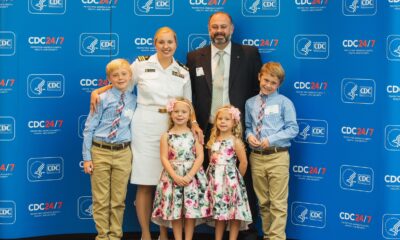Health & Wellness
Tips and Insight into Health insurance and open enrollment 2023
Published
2 years agoon
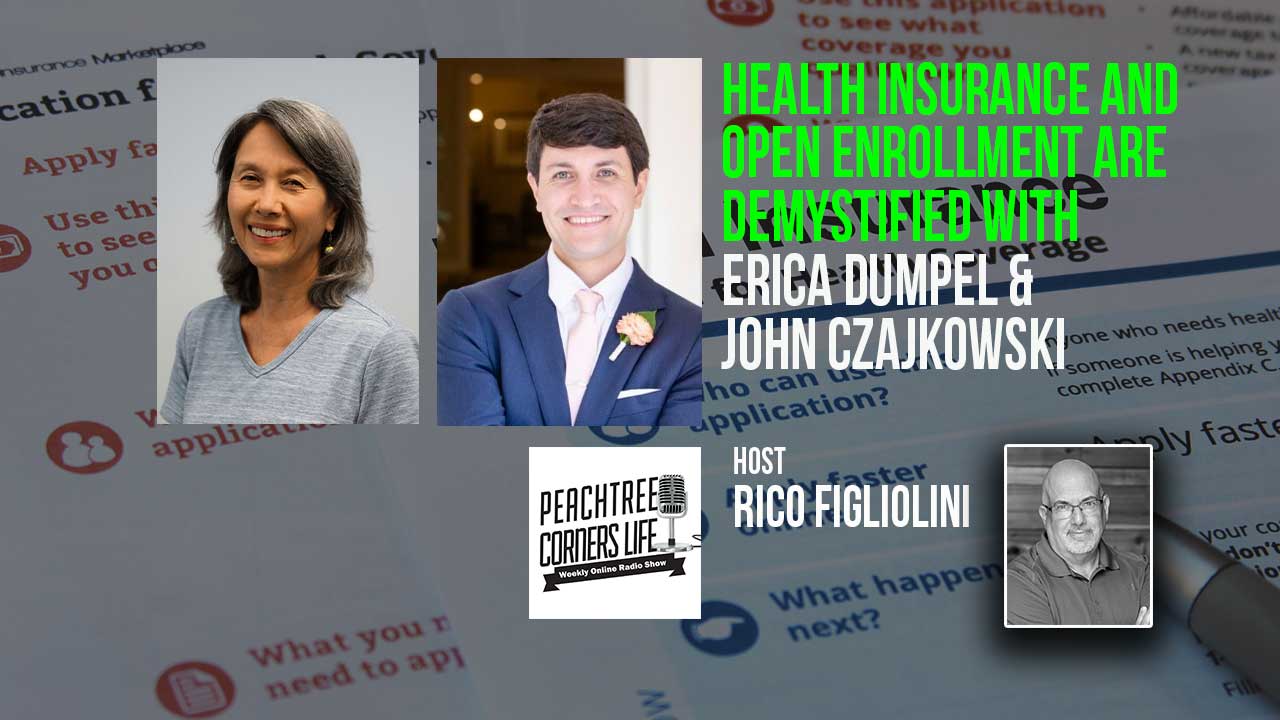
Health insurance and open enrollment are demystified by industry experts Erica Dumpel and John Czajkowski. Listeners will gain valuable insights and advice on topics like Medicare enrollment, the impact of politics on health insurance, the rise of state-based exchanges, the financial benefits of Health Savings Accounts (HSAs), considerations for different age groups, and employer-based insurance. This comprehensive discussion equips individuals with the knowledge they need to navigate the complexities of health insurance, ensuring they make informed decisions to protect their well-being.
Resources:
Website: CDAInc.net
Phone Number: 770-449-7369
Erica’s Email: Erica@cdainc.net
John’s Email: John@cdainc.net
Timestamp:
0:00:00 – Introduction
0:01:18 – Erica’s experience and background in the health insurance industry
0:02:09 – John Czajkowski and his role in the family-owned insurance brokerage
0:03:51 – Medicare and the open enrollment period
0:06:57 – Seeking assistance for Medicare enrollment
0:08:03 – Explanation of Medicare coverage in relation to employer-based insurance for individuals close to retirement
0:08:47 – The complexities of health insurance and options for different age groups
0:17:07 – Health insurance plans and considerations for families.
0:21:30 – Discussion about HSA and its uses
0:26:02 – Self-employed individuals and their health insurance options.
0:29:17 – Medicare and its impact on dependents.
0:31:20 – Options for college students and their health insurance.
0:32:07 – A strategic approach to health insurance.
0:36:12 – Compliance for employers and the ICRA alternative.
0:38:48 – Closing
Podcast Transcript
Rico Figliolini 0:00:00
Hi, everyone. This is Rico Figliolini, host of Peachtree Corners Life. I appreciate you guys joining us. Special guests today we have Erica Dumpel, founder and CEO of CDA, inc. Hey, Erica, nice to meet you.
Erica Dumpel 0:00:14
Hey, nice to be here.
Rico Figliolini 0:00:15
And we have John Czajkowski, who’s the president of the same company. This is a family business. And John is Erica’s son, who joined the business back in 2009, I believe, if that’s correct. Right. And the business, what we’re going to be discussing today is health insurance. As you may all know, at some point, this is open enrollment coming up soon. If you’re close to retirement, you may be thinking about medicare or options there. So we’re going to have a conversation today about that. I’m going to let Erica and John sort of lead us down this road because I don’t know enough to always ask questions. And I’ll be asking questions at the right point, I’m sure, because I’ll be heading into deciding whether I want to do Medicare or what I have to do with Medicare come 2024. But you all came off a meeting this morning from downtown Norcross, where you met a bunch of people, I think Erica did, where they had questions about health insurance and such. But before we get all into that, why don’t you tell me a little bit about yourself, Erica, and we’ll do the same with John.
Erica Dumpel 0:01:18
Okay. I came into the health insurance industry in 1975, so I have seen a lot of changes. We have a family business here, Peachtree Corners, actually in Tech Park. We have a staff that supports small group businesses, which is generally companies under 100 employees. We have a commitment to the individuals who work in those businesses or who are not covered through group insurance, as well as seniors who are having to grapple with the decisions about medicare depending on the size of their employer. Do they have to have it? Do they not have to have it if they are retiring? If they are not retiring? A lot of questions around that. And Rico, I know what you’re starting to go through with the mail that you receive about all this as well, so it can be a little daunting, for sure.
Rico Figliolini 0:02:07
John, tell us a little bit about yourself.
John Czajkowski 0:02:09
Okay. I am now president of this family owned insurance brokerage. I took over responsibility of the day to day as of January this year, 2023, and I’ve been doing this since 2009, as Erica mentioned. I have also seen a lot of change with the affordable care act happening in 2014 and with the way that the markets have adjusted to all of these new legislative requirements. I am also a very involved member of a trade association, the national association of benefits and insurance professionals. As of right now, I’m the president of Georgia, and I’m responsible for over 460 brokers that operate in the health insurance markets in this state.
Rico Figliolini 0:02:55
Cool. So insurance has always been complicated thing I think for people. Certainly it has been for me and everyone that I talk to. So many options. State of Georgia is different than the state of New York. Let’s say every state operates a bit different the mechanisms that can be used. And you’re right, things have changed. I mean I remember going on healthcare gov at one point. I don’t even know if at this point it’s necessary or if it’s where I need to be on at some point. I do have an employee insurance at this point but I may be looking at moving off that or will be moving off that when I turn 65 next year I think. So these are all things I think everyone has an issue with as far as getting some straight answers. Where can we start that makes sense? Erica, we’ll start with you. At what point? Where should we start on this?
Erica Dumpel 0:03:51
Okay, first let’s just start with it’s the worst time of year because everything is crushed into the end of the year. So the pressure of the medicare open enrollment which starts on Sunday, so between October 15 and December 7 there’s a lot of information out there for seniors. Then the individual open enrollment starts November 1 and goes through December 15 for a January 1 effective date. And add to that the majority of employer based plans renew in January. So there’s a lot of information floating around. So where do we start? It depends who you are, what you’re up to. So if you are a medicare person and you have a drug plan or a medicare advantage plan, you really need to go out to medicare gov, go through the breadcrumb trail, look at what the plans are for next year, make sure you’re in the right plan at the right pharmacy. If you are covered by individual insurance, it’s time to start looking and preparing to look at healthcare gov to make sure that you know what’s going on out there. If you are on an employer plan you should be receiving some kind of outline of future options in terms of deductibles copays plan designs. A lot of decisions to be made this time of year. People like us exist either as brokers for certain people or as consultants for others, depending where we can be of the biggest help.
Rico Figliolini 0:05:17
Let’s start with age groups I guess would make sense. Let’s start with my age group. I’m going to be a little like selfish here. So I’m heading into 65. I’ll be 65 in April, the beginning of April. So January, February, March. I’m told that January I should start looking at medicare. What exactly in brief, what are the bullet points, if you will, of what I should be doing come January?
Erica Dumpel 0:05:40
You need to go out to medicare gov, make sure you have a my Social Security account so that you can go in and enroll in medicare parts a and b. It’s not difficult, but be very careful. There are some odd nuances right now. I’ve run into some stuff recently that surprised us. One example, I did an enrollment with someone. The address was correct, except the country was listed as afghanistan. That will botch things really badly. And then they want you to send your original birth certificate to some address. No, we don’t do that. So if you can be three months ahead of it, do that, because if there’s going to be a glitch, that’s where it’s going to be. And no one has jurisdiction over the government, so we all have to untangle that.
Rico Figliolini 0:06:24
If so, when people do this and they apply, you shouldn’t have to submit any documentation because the federal government should already have that unless there’s an error.
Erica Dumpel 0:06:34
And the afghanistan, I think, was some kind of, I don’t know, space marker or something to tell somebody that the date of birth actually did not match what the individual put in, so the government had the wrong date of birth.
Rico Figliolini 0:06:46
Gotcha bizarre. Okay, so if I have issues and I decide that can’t go through this, can’t handle it, would your company do this for me?
Erica Dumpel 0:06:57
Yeah, I act as a medicare counselor, and we actually bring people through the enrollment. There’s a PDF and a PowerPoint that explains medicare, ABCD, medigap, why would I do this versus that? So it’s a full consult. We do charge for that. We can also then help with the enrollment in any parts of medicare. We are agnostic medicare, supplement medicare advantage, it doesn’t matter, but we really become the guide down this path.
Rico Figliolini 0:07:25
Okay, so that’s pretty much what needs to be done if you’re 65 or older. Right? I mean, that’s basically it. You need to make sure you’re on it. You apply for it three months out. You don’t want to wait until you’re 65 or certainly do it after you’re 65.
Erica Dumpel 0:07:40
Basically, if you are late without proper coverage, there are penalties, there are waiting, there are future dates. If you miss your open enrollment completely, you can only enroll the first quarter of the following year with the july 1 effective date. Imagine not having coverage for that.
Rico Figliolini 0:07:57
Have to people don’t have to be, quote, retired, taking retirement benefits to take advantage of medicare.
Erica Dumpel 0:08:03
In fact, for anyone who is employed, be very careful. If you work for a company that has less than 20 employees, if you don’t have medicare parts a and b in place, the commercial insurance carrier reserves the right to not cover the charges that medicare would otherwise be responsible for. That is a huge hole in your coverage.
Rico Figliolini 0:08:23
Okay, I didn’t know that. So being with a small company, 20 less employees, I turned 65, I’m on that private insurance. I really need to be on medicare is what you’re saying to me.
Erica Dumpel 0:08:34
Absolutely, yes.
Rico Figliolini 0:08:35
Okay. Otherwise you get penalized, which I guess makes sense because that private insurance company says, whoa, why should we be paying for this? The government pays for that.
Erica Dumpel 0:08:45
Medicare is primary.
John Czajkowski 0:08:46
Yeah, okay.
Rico Figliolini 0:08:47
All right, cool. All right, so now let’s go a little further younger, if you will. So we’re in our forty s. Fifty s? Maybe 30s. We’re private insurance likely, or maybe an individual insurance if we’re not employed or if we’re 1099, that’s a whole different story where we’re self employed and how do we do that? So why don’t you break that down for us? Who wants to take that? John?
John Czajkowski 0:09:13
As I mentioned, 2014 the game changed and a lot of people were forced into purchasing private health insurance on the individual market or they got penalized. Unfortunately, politics plays a large role in our industry and without pointing any fingers, both parties, they have taken my industry and picked it up like a football and ran with it. So with that in mind, in the state of Georgia, we are still operating with Healthcare gov as the primary shopping and comparison tool. But our governor is very quickly building out a state based exchange. So many states, both red and blue, they have pursued this and it gives the state a lot more control over how monies are divvied up and enrollment platform buildouts, as well as being able to kind of puff out your chest. You know, we enrolled x number of bodies, so that just got halted by CMS under this new federal administration. And I do expect it to be the primary shopping portal for 2025 open enrollment. So likely have seen some commercials probably during the UGA games for Georgia access and I would encourage your listeners and watchers go check out the website right now. It is a little eye opening what we were prepared to move forward with because it is not, in my opinion, ready for primetime. I have been working in my other role as the President of Georgia, trying to encourage the state to reassess how we are approaching this. We were going to be the only state in the country that had pursued a state based exchange without having a centralized shopping and comparison tool. Once we flick that switch, we lose access to Healthcare Gov, which has a lot of federal funding built into it. And that’s something that I’ve been very involved with trying to make sure that when they do flick that switch, it’s ready for primetime. But Healthcare Gov right now is still the best shopping tool that I use in this office. It does show you all of the options that are out there. And another thing to consider is with a number of federal legislative changes and bills that have passed in the past couple of years, the thresholds for eligibility for financial aid or subsidy have been significantly expanded. Just a couple of years ago, family of three, older parents with kind of younger to middle aged child, middle aged in their 20s with a household income of let’s say $100,000, you would not be eligible for anything or a very small pittance of a subsidy amount. That’s free money from the government that you have applied towards your premium. So immediate discounting nowadays I can take that same family and they are very likely eligible for several hundred dollars a month in financial assistance. Again, free money from the government. It is designed to be applied towards your premiums. And that’s how this system should have been running since 2014. But with a national rollout of a program like this and with politics playing a role in it, one side of the fence holds the purse strings and the other side they’re able to pass substantial laws and there’s got to be some sort of meshing of the two in order for a system like this to be successful. So now we have opportunity for the next couple of years to really take advantage of the aid that we were supposed to have been receiving this entire time. So if you have gotten a bad taste in your mouth over the years with your individual insurance and have not gone back in to reassess do it, you might be surprised with what you’re eligible for.
Rico Figliolini 0:13:07
It sounds surprising because I do remember going on Healthcare Gov some years back and I got subsidized. My income was a little different than it is today, but didn’t see that subsidy later as my income grew. And so this sounds totally different than it was before.
John Czajkowski 0:13:25
It is.
Rico Figliolini 0:13:27
And if I remember correctly, I think part of the Healthcare Gov, like 80, 90% of it was being covered by federal funds. But at some .4 or five, six years into it, the state is supposed to take over the bulk of the money being used. I think at least that’s the way it was at one point, right? Funding, that the state would pick up more funding, bigger formula percentage portion of it. And is that why the state is trying to move towards their system? Because it sounds like the Georgia Access would actually give fewer people coverage because of income and other things and also provide less coverage. Even if you were able to get it, that would give you less coverage on your insurance. So is the state trying to say.
John Czajkowski 0:14:13
It’S more of just a platform at this point? So like Healthcare Gov, it’s just an enrollment tool and that’s what Georgia Access at this stage is looking to, or when the switch gets flicked, then the state is going to have a lot more say over eligibility for subsidy and the actual dollar amounts that you are able to pull from the system. But at the moment I’ll say thankfully, we’re not at that stage yet. There’s still some tweaks that need to be made on the website and I’m hoping over the next couple of months and into first quarter of next year that they’re going to have a lot more traction with what I’m hoping they’re building right now.
Rico Figliolini 0:15:02
Okay. But essentially, once the switch is done and it’s in state control, they will control how much money they will fund. Who control?
John Czajkowski 0:15:14
There are some federal guidelines they have to follow, but ultimately, the state makes a lot of rules they want us to adhere to.
Rico Figliolini 0:15:22
Okay. All right, so fine. We’re not there yet. I guess that’s okay. As far as picking plans, though, if come this enrollment period, what should families be looking at that are? I guess what would be the better thing to start with? Families where the head of household is self employed, or families where the parents are full time employed with health coverage? Where should we start and how should they be looking at that?
Erica Dumpel 0:15:54
I would say start with the families that are employed because a large percentage of people have their coverage through their employer, and generally there will be a couple of options. A high low, high, mid low type of thing. And the thing that we’ve always asked people is, how do you use this? Do you have something planned? Are you having a hip replaced? Are you on a program where you have constant need for treatment? Do you have a bunch of little kids running around with tubes in their ears and you’re at the pediatrician every year? That person is different from a lot of the other people who say, I never use this stuff. Most guys don’t even have a doctor’s visit until they hit their late 50s when things start to go wrong. So look at a high deductible. Look at how much you’re saving. Look at what you’re putting at risk. If there’s an opportunity to be in a high deductible health plan that allows HSA contributions, certainly jump all over that tax deductible money set aside that if you take it out for medical expenses, you never pay taxes on with a lower premium, that’s a win win. So from that perspective, that’s kind of how we look at it on that side. John looks at it similarly on the individual side, but jump on in on that one.
John Czajkowski 0:17:07
Yeah. There aren’t nearly as many plan design options on the individual market. There’s usually I really go in with the mindset of there’s a template out there with three different plans that really are consistent across the board. With every insurance carrier, there’s going to be one plan on the lower end, it’s going to have a higher deductible. Usually in that $6,000 range. You get copays for the bare necessities. You get the sniffles and go to the PCP. You go to a specialist, you got a flat dollar amount every time you go in for that. But in a lot of cases, you go in for blood work. You go in for advanced imaging like an MRI or a Cat scan, all the way up to hospitalizations and outpatient surgeries. All of that is applying towards your deductible. As long as you stay in the network, you’re going to get a discount, which is probably going to be a substantial reduction in your expenses. Whatever’s left over after that discounting, that falls on you, and that applies towards your deductible. And for a lot of us life. Myself, I’m 37. Knock on wood. I don’t really have much going on. That is probably where I’m going to gravitate. I don’t necessarily feel the need to prepay in premiums for a plan with a $2,000 deductible. The way I look at it is, if I am buying this for the big stuff, I’m not buying it for the piddly little copays and things. I’m buying it if I get in a car accident on 285, if I fall off a ladder and break my arm, if I’m diagnosed with something horrible that’s going to turn into a chronic illness. I’m really concerned about my out of pocket maximum. So that’s the most that I can be responsible for if I have a bad year. When you look at most of these products on the individual market, the out of pocket maximum is generally in the same ballpark. Might be a couple of $100 difference between a plan that my premiums are $600 a month versus a plan where it’s $1,000 a month. And when I’m looking at that direct comparison, I’ve got to think about how am I really intending to use? If I’m treating as a catastrophic product, I’m not really going to get much out of that lower deductible plan design, and I’m going to be guaranteeing that I’m spending more money on my premiums every single month. So in that instance, I’m more than happy to take a little bit more risk on the front end with a higher deductible, knowing that my out of pocket expenses, in a worst case scenario, I’m not going to be that far off. And then the HSA component on some of these products, if you’re young and healthy, if you’ve got nothing on the radar, and you are truly treating this as a catastrophic product, you have no intention of using daily usage benefits. That’s something that I absolutely take advantage of. And I think a lot of our clients in all age ranges should be considering. Because I’m allowed to take money from my checking account and transfer it over to a health savings account, that is a tax deductible contribution, and it’s not a use it or lose it. It just sits in this account waiting for the rainy day, waiting for the big something that pops up, where, for instance, my wife and I had a kid last year, I had to pull her onto my policy so that we could deliver at Northside, the baby factory in the Southeast.
Rico Figliolini 0:20:15
Right?
John Czajkowski 0:20:17
In doing so, we had a $6,900 out of pocket maximum, three days in the hospital, epidural the whole thing. She maxed out her coverage. And so with that, I had been preparing financially by maxing out my HSA contributions.
Rico Figliolini 0:20:32
Sure.
John Czajkowski 0:20:32
When it came the time for me to pay that bill, I swiped my HSA debit card without having to have a garage sale, without having to ask mom and dad for help. I was incentivized by the IRS to financially prepare for future medical expenses. And so with that, yes, the small things are going to sting a little bit more because you’re not getting a copay for it. But for me, I don’t use this stuff, so that’s not a big deal. If I have to pay on a cash basis, a couple of $100 for a specialist visit or something like that, that’s kind of how we approach this with all of our clients. It’s really a needs based evaluation. And tell us, what do you have on the radar? If it’s nothing, are you really going to get your money’s worth by going to a richer, more expensive product?
Rico Figliolini 0:21:16
So let me ask you, on the HSA, for example, that’s mainly used for deductibles or the that’s not used for anything else. I mean, you can’t pay for a health club membership. I mean, it’s not made for that, right?
John Czajkowski 0:21:30
It’s made not it’s really intended for any type of care for your body, whether it be your mouth, whether it be your eyes, whether it be your internals whatever. If I go to my annual physical, that office visit should be complimentary, draw blood, and they ship that off to a third party. Think Quest, Diagnostics Lab Core, something like that. That is by definition, a diagnostic evaluation of my blood. I will have an expense for that. I can absolutely use my HSA dollars for that expense. I can use it for prescriptions. Whether I’m getting my discount through my plan or using GoodRx or another discount program out there. It’s quite literally almost anything revolving around the care of your body.
Rico Figliolini 0:22:18
Okay. And you don’t lose it. It stays with you. It’s a tax deductible. What’s the maximum you can put into an HSA?
John Czajkowski 0:22:27
It shifts every year for 2023. Someone under 55, the maximum you can put in is $3,850. But it is prorated. So for every month that you were on an HSA eligible product, you can put in that calculated whatever dollar amount it was. 38. 50 is the most you can put in over a twelve month period. If you’re over 55, you get an extra $1,000 to dump in. And that’s just for an individual. If I have another person on my coverage on another HSA eligible product in my family, we both get to make a contribution to that HSA. And so when we’re talking about families, especially with young kids, that may be something that you might be interested in. You can dump in almost $9,000 every year, and it ticks up year after year. $5100. That’s a nice little nest egg in the event someone gets into gymnastics or football and they start breaking stuff.
Rico Figliolini 0:23:27
Yeah. And it’s an aggregate amount, so it doesn’t matter who you’re using it for within the family, though. Correct.
John Czajkowski 0:23:34
As long as they’re part of your immediate family, they don’t even have to be covered by your policy.
Rico Figliolini 0:23:39
Oh, really? Okay. Correct. Wow. Okay. I didn’t know that. That’s cool. I have three kids. They’re all in there. One’s 19, the other two are in their 20s. So my oldest, he’s like, this HSA, it’s at another company. We started there four years ago. I still keep getting these statements. There wasn’t that much in there. It was under 1000. He’s like, Do I really need that? I’m like, don’t throw away the money. But does it matter where it’s at? Or should he roll that into a.
John Czajkowski 0:24:14
Different ah, that’s a really interesting question. So most people, they learn about HSAs through their employer group, and if they wander off in a different direction, that HSA is still with whatever system it originated in, but you don’t have to keep it there. For instance, I set mine up through Fidelity, not being paid by them, but found that they were probably the best option for how I was using it. And so that’s simply a quick application online. The money gets transferred within a couple of days, and then it just sits there. One thing that most people might not take advantage of, that they should be allowed to do, is if you set up your HSA with a financial institution that also does investments, technically speaking, I am going to set whatever ceiling I want for my HSA contributions over whatever duration of time for me. I’ve got three people in my family I’m going to set aside three out of pocket maximums, but anything beyond that, I consider fun money. I can still make my contributions and get a tax deduction, but then I can immediately flip over money into my investment portfolio and potentially make money off of my tax deductible contributions if I sell those stocks. But at the same time, I have the potential of making money off of this.
Rico Figliolini 0:25:34
Wow. Okay. I didn’t know that. Yeah. So that means that it’s there. You’ve already taken the tax advantage, and now you’re going to use it in investments versus just letting it sit there as cash. Makes sense.
John Czajkowski 0:25:46
The name of the game is set aside whatever dollar amount you need if things go sideways, anything beyond that, that’s your money to do whatever you want with.
Rico Figliolini 0:25:55
Understood. Wow. Okay. Well, that makes sense. I wish I knew that earlier.
John Czajkowski 0:26:02
Well, I was talking with a guy who was moving into Medicare. Last open enrollment, he was turning 65. He and his wife had been on an HSA style program since they were younger than me, in their mid 30s.
Rico Figliolini 0:26:14
Okay.
John Czajkowski 0:26:14
He had about 80 grand sitting in this HSA, and I had to break it to him. You had this option. I mean, imagine if in the 90s, he put $10,000 into Microsoft or Apple or IBM. He’d be a billionaire. Now, that’s something that I think most people are never going to take advantage of because it’s not really common knowledge. But hey, if you’re listening, go talk to your financial advisor.
Rico Figliolini 0:26:40
Yeah, I mean, easily enough, it could easily just even go into an index fund. It doesn’t have to go into individual stocks, so it could go into something safer, relative. All right, so now let’s shift a little younger maybe, or to self employed. So if you’re self employed, you have a company, you’re doing maybe a couple of hundred thousand or you’re doing a few million. What’s the difference there as far as looking at if you’re self employed?
Erica Dumpel 0:27:11
Well, it depends whether or not you have employees. If it’s just you, you are in the individual market with or without subsidy, you are in the individual market. But let’s assume you have employees, not 1099. There is a difference, sure. But if you have employees, that opens up the door, depending what you want to do with your health insurance. We have any number of small companies that come to us and say we are accustomed to having, and more than the employees we are trying to attract are accustomed to having dental, vision, short term disability, all these other things. And medical those could be created once you have two people on the plan who are not husband and wife. So that’s a starting point. But what I’ve started seeing in the last couple of years is a little different. A lot of people think I have a company, so I should be providing group medical insurance. And we’re seeing is that may not necessarily be in your company’s best interest, especially if you are a new company. And we’re having a lot of conversations about what can you provide as an employer that an employee cannot get on their own, either as rich a plan or as cost effective a plan. And that really is the dental, vision, life and disability, particularly short term disability. So we’re starting to talk about packaging those things, letting the employees go to the marketplace or get individual insurance. Because what we’re seeing is when an employer puts in a plan and it is available to the employees, they are no longer eligible necessarily to apply for a marketplace subsidy. And as a result of that, you are sometimes shooting people in the foot. So that’s a conversation to really have. When you do have employees, before you pull the trigger, pay a little attention to what they’ve been doing for their health insurance and what they value. And John can go into more detail about all of these family opportunities where plans have to be minimum value and minimum affordability. So there are calculations where one part of the family may qualify for a subsidy, where the other may be better off on a group plan. But there’s some heavy conversation there right now.
Rico Figliolini 0:29:17
Let me ask you this then. For example, I have a. 19 year old, and if I go into Medicare so this is a little different. We’re shifting a little bit. But if I go into Medicare for next year, which I would, he’s not on my insurance anymore. I mean, he has to go for his own insurance. So he would go through, I’m assuming.
John Czajkowski 0:29:37
Extra layer of complication. Is he paying his own taxes?
Rico Figliolini 0:29:41
Yeah, probably not. He’ll probably still be independent for another year or two.
John Czajkowski 0:29:46
If you are still covering this 19 year old on your taxes and getting your tax deduction, well, the government’s going to make sure that your income is counted for when applying for this child’s insurance and subsidy. So it is a little bit tricky and confusing out there, and even to the effect that if we tried to apply this way and saying that you were covered by Medicare, but your 19 year old is coming in, the system may ask for documentation. The system may require that you submit proof of income or something like that. So there’s a lot of barriers that a lot of preparation ahead of submitting an application is going to be very beneficial for you.
Erica Dumpel 0:30:29
Well, Enrico, let me add another thing. If your 19 year old is in college, particularly if they are in the University of Georgia system kenneth, Georgia Tech, Georgia State, whatever, the university programs are so much stronger than they used to be. Imagine a $500 deductible. Imagine a rate of maybe 100 and $5180 a month. It’s a large population of an age group that is only there for a few years because they come and they go through the system. So it’s not a long term commitment on the part of the insurance company. And these kids generally don’t have anything. It’s a very healthy group. So I’m saying to a lot of folks, look at your university system program, whether it’s Georgia or whatever private college a child may be going to in another state, take a real close look at what’s available out there. It’s much better than it used to be.
Rico Figliolini 0:31:20
Oh, wow. I didn’t even know that they provide that type of coverage through the university system. So they could just take it through there.
Erica Dumpel 0:31:27
Yeah. You are required to sign off that you have creditable coverage or you’re signing up over here.
John Czajkowski 0:31:32
As the college systems, I believe they are still contracted with the UnitedHealthcare. So you get access to a very robust network of providers and facilities. It still heavily relies on the school’s clinic system for the minor stuff, but if something big pops up, you get access to a national PBO if nothing’s changed at this point.
Rico Figliolini 0:31:55
Okay, cool. All right. So at this point, what have we not covered, John, that you feel that we should be covering right now in our conversation today?
John Czajkowski 0:32:07
I would say being strategic about this. So Erica touched on this and you had another prodding question. So if I am employed by a company that is offering benefits, I’m stuck. My option as an employee is I either accept the coverage and the employer contribution to help with my premium reduction or I’m on my own. But things have changed at the federal level when it comes to calculating affordability. And nowadays the remaining family members, they do have the option to split off from you, go to the individual market and potentially be found eligible for subsidy. So that’s something that we have been encouraging a lot of our small group clients to consider. We are one of these unicorns out there where we operate in all three markets on a daily basis. So individual under 65 Medicare and groups where it may make sense to have dual option internal to your household and especially if there are different sets of needs between one family member and the rest of them, that may make a lot of sense. Unfortunately, on the individual market, everything is an HMO, which means that you will be staying in the established network with whichever carrier you choose or else you’re on your own. The insurance is not going to step in. But these plans and networks have been getting a lot more accessible over the years and that is primarily because the hospital systems in a lot of metropolitan areas, they’re getting fractured and they’re signing individual contracts with specific insurance carriers. So, for instance, in Atlanta, the big ones are I’m probably going to forget someone. Piedmont, Northside, WellStar, Emery. And if you’re up here in kind of the northern area, maybe Northeast Georgia Medical Center, if I choose a Blue Cross or if I choose an Aetna or a Cigna, I do not get access to all of those hospital systems. And so I do have to be pretty diligent in which program I’m opting into if I maybe have a planned surgery coming up. And I would prefer to be in one hospital system versus another. So that is one layer of complication that a lot of people, they say, oh, I know that company name, that’s a household name, I can probably trust them. And they opt into something without doing the due diligence to figure out, well, are all of my providers in network or am I going to get only a handful of them? And in a lot of cases I have to have pretty stark conversations which providers do you care about the most?
Rico Figliolini 0:34:41
Right, that makes sense. And specialists, they might be someone that has a specialist that they work with over the years. They don’t want to lose that person or medication that they’re taking that I’ve seen. Some health insurance will not cover certain medications, but they’ll cover something within that that works the same way, maybe quote works the same way or the generic versus the labeled or sometimes they won’t even cover certain medications at all that you may be taking.
John Czajkowski 0:35:12
So it’s a bit crazy and sometimes that’s actually to your benefit. So in a lot of cases, when we have clients that do have prescriptions, whether it be on a group medicare or under 65, it might be a gift that your plan doesn’t cover that medication, because that might give you the opportunity to go to the drug manufacturer’s website, apply for their discount program, and take advantage of that. There are all these fine print stipulations where in some cases, if it is covered, you get in, if it’s not covered, you get in. So it’s different between different medications, but they want you taking their drugs. If they’re willing to subsidize to make sure that you are a hard carrying member of their prescription, then that’s their option to make that an option for you, available to you.
Rico Figliolini 0:36:03
Americans are funny that way, I guess. If you were using Crest toothpaste since you were a kid, you’re probably still using Crest tooth toothpaste, right? It’s similar to medication, right? Most people won’t get off because they know that works for them. The efficacy, go figure. But yeah, Americans are funny that way. We do stick with our childhood brands in some ways for the long run. Erica, have we winding down a little bit in this conversation? Have we missed anything that we should touch upon from your point?
Erica Dumpel 0:36:38
There is for the employers, for the employer based plans, there are a couple of things that are not being discussed that I think are important, and the biggest one is compliance. If I have a small company, if I have a big company, there are certain things that I must do for the federal government or they get very upset and start finding me. Penalties, taxes, fines can be debilitating. So if a company is working with a broker, make sure that they have gotten their compliance lined up. There are deadlines on X date. This needs to be filed with thirty five cents per belly button. I mean, stupid stuff, but you miss the deadlines and can be a big problem. We’ve had one company that came to us that had massively bad health history, and they were facing for January of 23, a massive rate increase over what they already couldn’t afford, and came and asked us for another alternative. And we came up with an ICRA, which is an individual coverage health reimbursement account. So imagine you’ve got 60 employees running around, and if I’ve done my job right, Rico, nobody’s happy. It doesn’t have your doctors. It’s too expensive for JJ. It’s richer than you want to be. So what ICRA does is it says, everybody, here’s your dollar amount, go shopping. And it’s a portal similar to healthcare gov. But you want a rich plan, you want a leading plan, you want these doctors, you want that hospital system. So that’s an alternative. It is still new, there are still glitches in the system, but that’s something to keep an eye open for in the future.
Rico Figliolini 0:38:12
Cool, right? What I’d like this point and we’ve arrived towards the end of our time together. I want people to know where they can. So for example, you charge a fee if someone wants to come to you to have you all handle it right, for Medicare, let’s say. Is that tax deductible by any chance?
Erica Dumpel 0:38:33
Unfortunately not.
Rico Figliolini 0:38:35
I sort of knew that aspect. I thought it is. All right, so if someone wants to come to you to get your assistance, whether they’re a company or an individual, how would they find information on your wall?
Erica Dumpel 0:38:48
The website is cdainc.net. Our phone number is 770-449-7369. And if you want to reach any of us, the emails are simple, it’s our first name. In my case, Erica, in John’s case, John@cdainc.net.
John Czajkowski 0:39:08
And if anyone we’re local, you can find us. We’re not some unnamed or mask over who is actually helping you. It is us. We are in Peachtree Corners. We are in Tech Park. Come knock on our door if you really want to get our attention.
Rico Figliolini 0:39:27
Yes. The good part about John and Eric is I see them at Southwest Gwinnett chamber. They’ve been at the PDC coffee meets Wednesday morning in downtown Norcross. So they’re very involved in the community. They’re out there talking about this, giving free advice out there as well at these speaking engagements that they do so do reach out to them. They are Peachtree Corners based and members of the Southwest Corners Chamber. So cool. Well, thank you guys. I appreciate you spending some time this afternoon with me talking about Medicare and insurance and open enrollment and all that. Before we leave, though, hang with me for a minute. I just want to say thank you to two of our sponsors, Clearwave Fiber, a company that does business internet and residential internet, but they have over a thousand businesses in Peachtree Corners. They too are local to a degree and they have reps here, so they’re not your cable company guy. So if you need to find out a little bit more about how they do their services for your business, check them out. Clearwave fiber and also EV Remodeling Inc. They do design to build renovation work on your home indoors and out. Eli is the owner of the company, lives here in Peachtree Corners. Great family, they do good work, so check them out. Also EVremodelinginc.com. So thanks again, Erica, John, appreciate you being with me.
Erica Dumpel 0:40:50
Our pleasure.
John Czajkowski 0:40:51
Thank you very much, Rico.
Rico Figliolini 0:40:53
Thank you.
Related
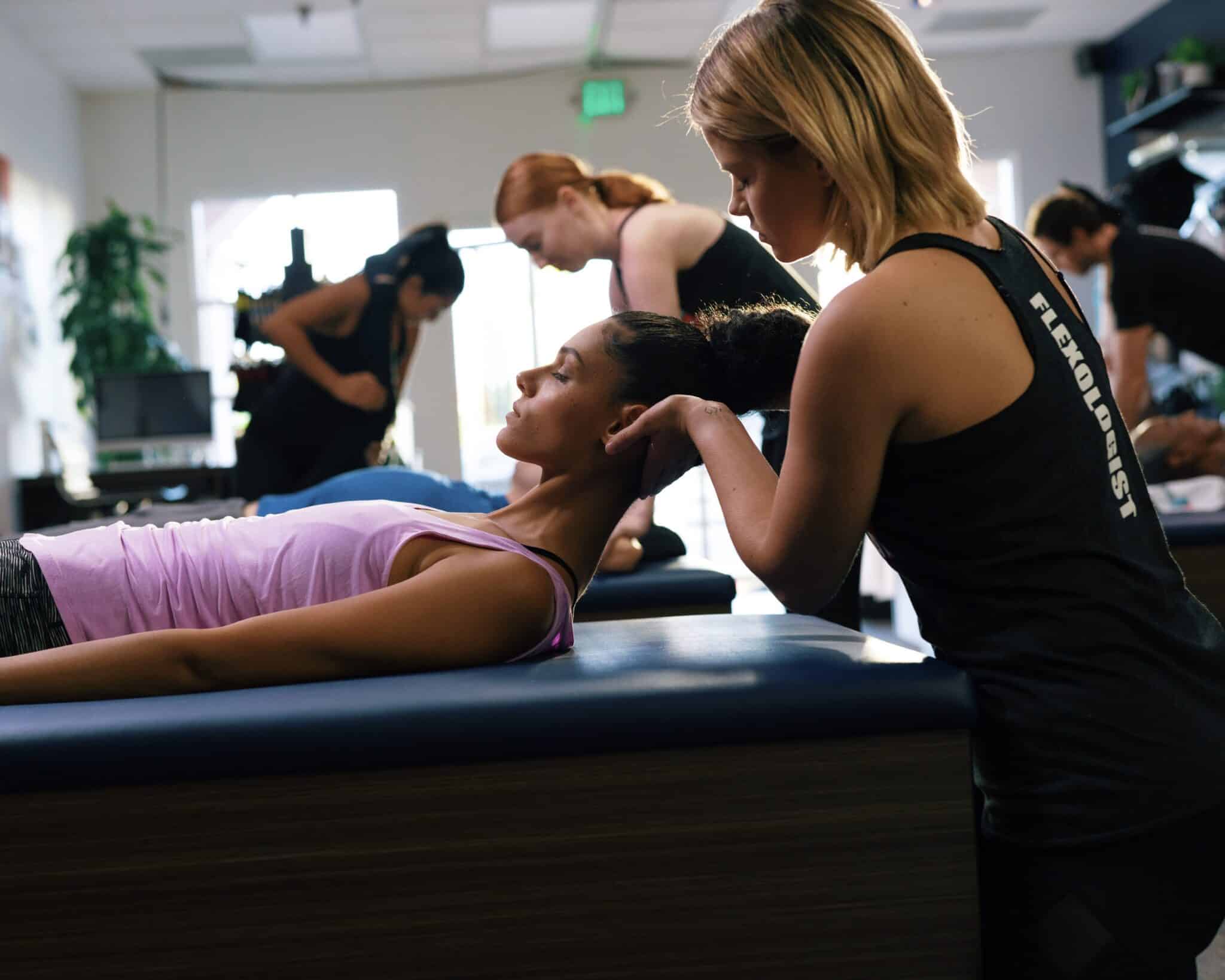
The Forum in Peachtree Corners features a variety of businesses focused on health and wellness, offering services designed to meet individual needs. From fitness programs and recovery treatments to relaxation and aesthetic care, each business prioritizes physical and mental well-being.
StretchLab
StretchLab offers personalized stretching sessions to improve flexibility, mobility and overall physical health. Each client’s journey begins with a focus on their goals, whether it’s enhancing athletic performance, reducing stress or relieving pain.
“We dive into understanding each individual’s physical and mental needs to craft the perfect stretch experience,” said franchise owner Ghada Kheirbek.
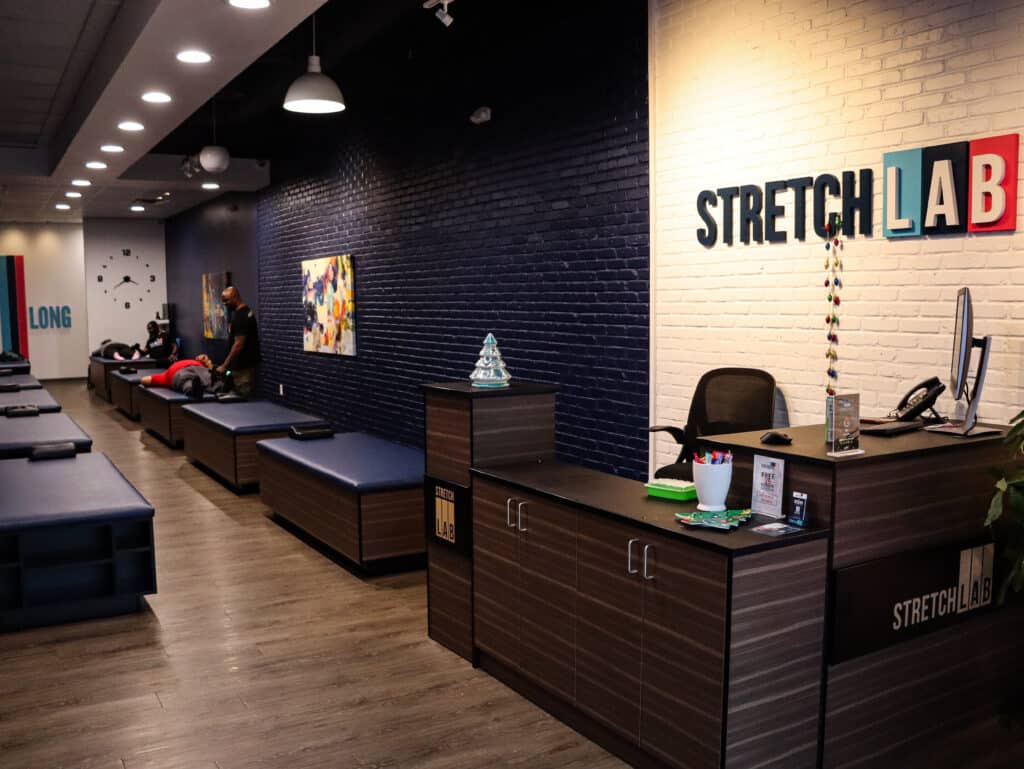
StretchLab’s MAPS technology sets it apart, analyzing Mobility, Activation, Posture and Symmetry using advanced tools. This allows flexologists to create custom plans tailored to individual progress. Sessions incorporate Proprioceptive Neuromuscular Facilitation (PNF) techniques, combining muscle activation and deep stretching for long-term results.
“Our approach focuses on areas you can’t stretch on your own, unlocking better movement and relief,” Kheirbek explained.
Community engagement is a priority, with partnerships with local schools, yoga studios and organizations.
StretchLab is located at 4880 Peachtree Parkway, Suite 1125, Peachtree Corners, GA 30092. For more information or to schedule a session, visit stretchlab.com/location/peachtree-corners or call (470) 410-6664.
Dermani MedSpa
Dermani MedSpa provides medical-grade aesthetic treatments, including facials, Botox and laser hair removal. The medspa focuses on enhancing natural beauty while prioritizing safety and comfort, offering services performed by highly trained staff in a professional, welcoming environment.
Each treatment is tailored to individual needs, ensuring clients achieve results aligned with their goals. Clients value the medspa’s attention to detail and commitment to quality, making it a trusted choice for aesthetic care.
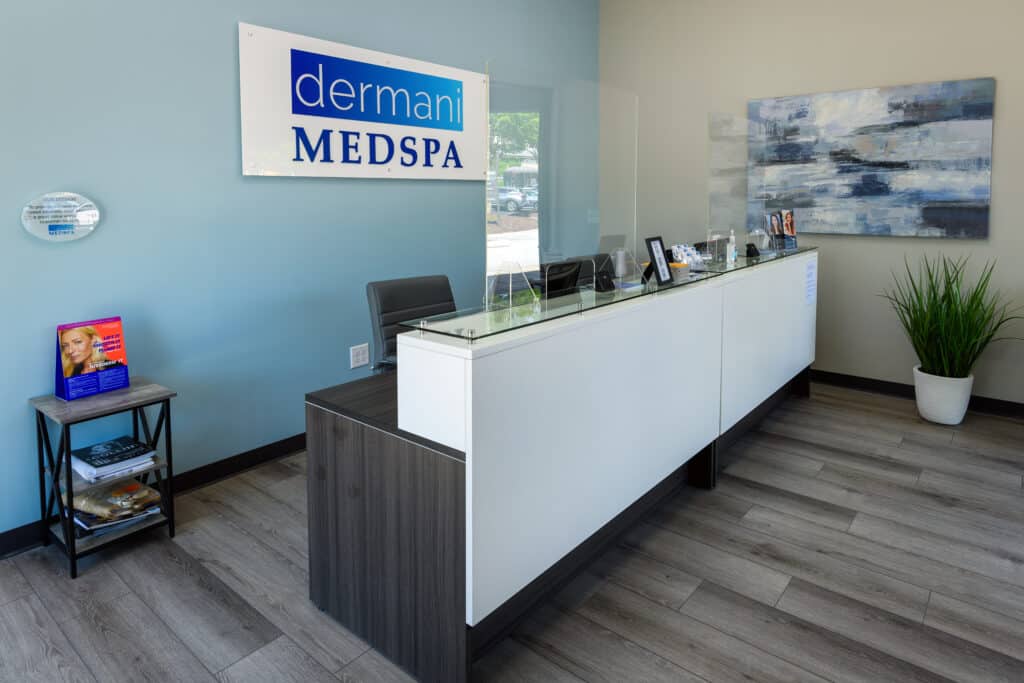
“Dermani offers a variety of medical-based aesthetic treatments,” said Charlotte Hinton, marketing manager at Jamestown, The Forum. “Outside of just loving their team as a whole — their girls are the best — my colleagues and I love to see them for facials, Botox and laser hair removal.”
The medspa’s reliable, results-driven services cater to clients seeking everything from routine skin maintenance to advanced aesthetic solutions.
Dermani MedSpa is located at 5165 Peachtree Parkway, Suite 230, Peachtree Corners, GA 30092. To schedule an appointment or learn more, visit dermanimedspa.com/peachtree-corners-norcross or call (404) 383-1108.
The NOW Massage
The NOW Massage is more than just a spa; it’s a tranquil retreat designed to help clients disconnect from daily stress and reconnect within. The massage studio has a serene atmosphere inspired by beachside destinations.
“In today’s fast-paced, digitally driven world, self-care is no longer a luxury but a necessity,” said Gara Post, co-founder of The NOW Massage.

The NOW’s thoughtfully curated menu features three signature massages: The NOW, a relaxation-focused experience; The HEALER, which balances energy and reduces stress; and The STRETCH, a recovery-focused massage ideal for active lifestyles. Enhancements like Herbal Heat Therapy, Deep Tissue and Gua Sha allow clients to customize their experience.
“Our therapists undergo advanced training to ensure each session is tailored to individual needs,” explained Devin Borland, franchise owner.
Community involvement is central to The NOW’s mission. The studio supports first responders, recognizes educators and participates in local wellness events. “We’re proud to be part of the Peachtree Corners community,” Borland added.
The NOW Massage is located at 5161 Peachtree Parkway, Suite 615, Peachtree Corners, GA 30092. For appointments, visit thenowmassage.com/peachtree-corners or call (678) 615-3375.
Alloy Personal Training
Alloy Personal Training is redefining fitness in Peachtree Corners with a personalized approach tailored to help clients achieve lasting health and wellness.
“Our goal is to create a sustainable fitness journey for every individual, no matter where they’re starting,” said Margaret Bruemmer, fitness director at Alloy Personal Training.
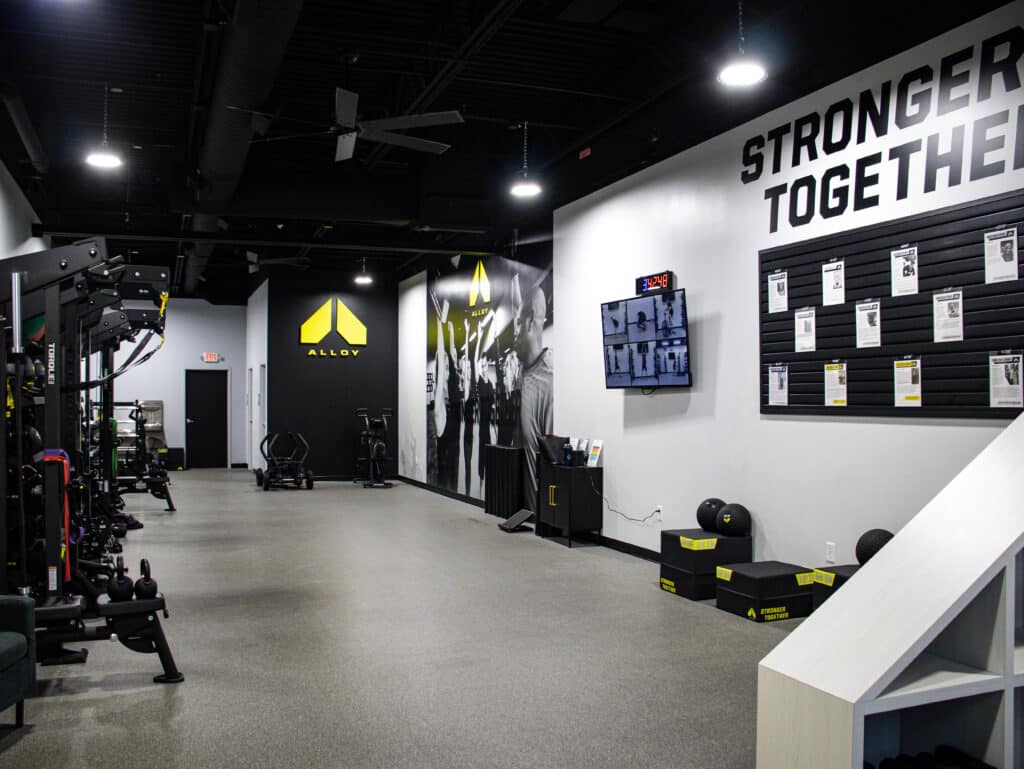
At the heart of Alloy’s method is the Functional Movement Screen (FMS), a comprehensive evaluation tool that assesses a client’s current fitness level. This process ensures that every workout is not only effective but also safe.
“We use FMS to identify a client’s unique needs and design a program that works for them,” Bruemmer explained.
Trainers provide one-on-one guidance, helping clients navigate structured routines that focus on proper form, technique and measurable progress. Each session builds confidence while addressing individual health goals.
Located at 4880 Peachtree Parkway, Suite 1135, Peachtree Corners, GA 30092, Alloy Personal Training offers flexible hours to accommodate clients’ busy lifestyles. To learn more or schedule a consultation, visit alloypersonaltraining.com/location/alloy-peachtree-corners-ga or call (678) 578-4984.
Club Pilates
Club Pilates combines timeless Pilates principles with innovative techniques to offer a holistic approach to fitness and wellness. The studio provides a welcoming environment for clients of all fitness levels, ensuring that everyone can benefit from the practice.
“Pilates is about more than just fitness — it’s about helping our members discover balance, both physically and mentally,” said Victoria Steere, director of community engagement.
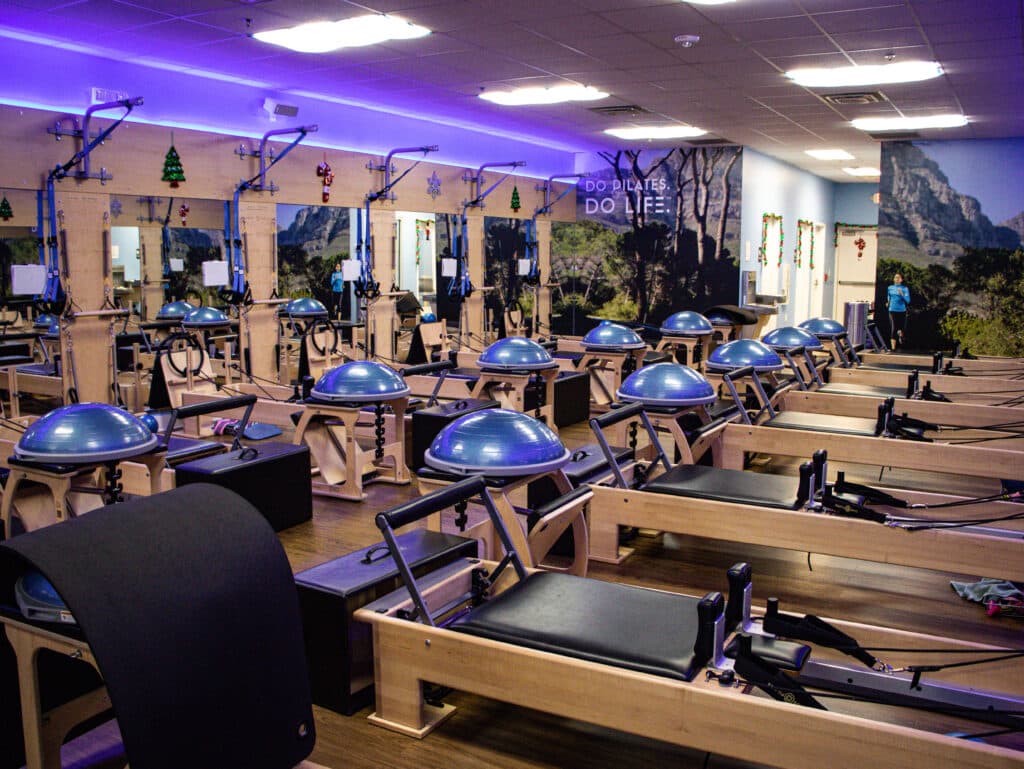
Each class is tailored to individual needs, with certified instructors guiding clients through sessions that improve posture, core strength and overall body awareness. Whether it’s a high-energy cardio class or a gentle stretch-focused session, Club Pilates helps clients achieve their fitness goals while promoting mindfulness and intentional movement.
“Many of our members describe their time here as an essential hour of self-care, a break from their busy lives,” Steere added.
By integrating physical and mental balance into its classes, Club Pilates empowers clients to leave each session feeling stronger, more confident and recharged.
The studio is located at 4880 Peachtree Parkway, Suite 1130, Peachtree Corners, GA 30092. For more information or to schedule a session, visit clubpilates.com/location/peachtreecorners or call (404) 902-2583.
Icebox Cryotherapy
Icebox Cryotherapy brings innovative recovery and wellness treatments to Peachtree Corners, offering clients a practical way to rejuvenate their bodies and manage stress. Specializing in full-body cryotherapy, cryofacials and compression therapy, the studio is a haven for those seeking to reduce inflammation, improve circulation and enhance overall physical performance.
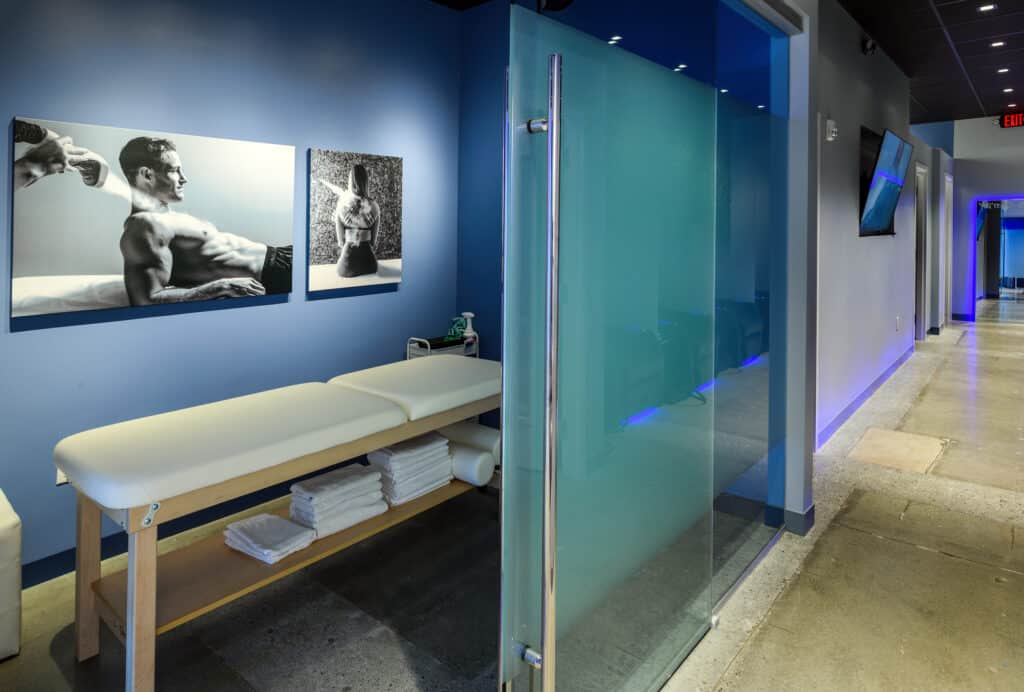
Full-body cryotherapy sessions expose the body to controlled cold temperatures, stimulating a natural response that accelerates recovery and reduces tension. Cryofacials, on the other hand, provide a gentle way to refresh the skin, diminish puffiness and promote a youthful glow. For athletes or individuals managing chronic muscle stress, compression therapy targets specific areas to relieve tension and improve mobility.
“They’re a fantastic option for anyone looking to rejuvenate their skin while managing stress,” shared Hinton.
Located at 4880 Peachtree Parkway, Suite 1120B, Peachtree Corners, GA 30092, Icebox Cryotherapy invites clients to experience their transformative services. For appointments or more information, visit iceboxtherapy.com/peachtree-corners-ga or call (678) 284-2570.
Perspire Sauna Studio
Perspire Sauna Studio is set to redefine wellness in Peachtree Corners, combining ancient practices with modern technology to create a sanctuary for self-care. Offering infrared sauna therapy, red-light therapy and contrast therapy, the studio is designed to help clients detox, de-stress and recharge.
“We’re bringing cutting-edge wellness options to the community, creating a space where self-care becomes a part of your weekly routine,” said Amanda Arboleda Ridley, studio owner.
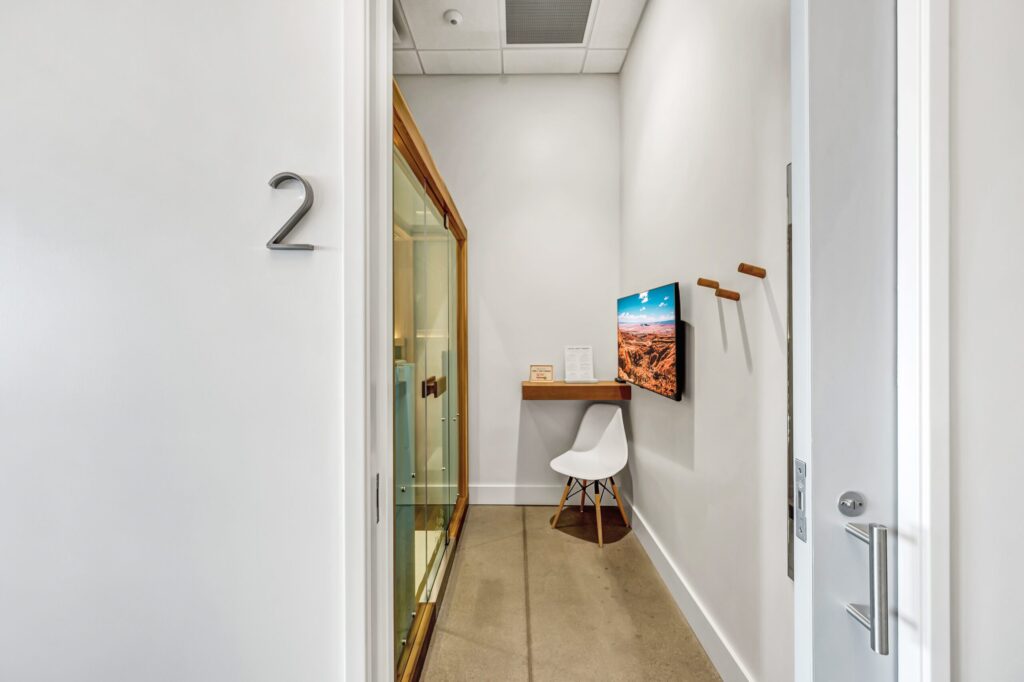
Infrared saunas use controlled heat to promote detoxification and improve circulation, providing both physical and mental health benefits. Red-light therapy enhances skin health and stimulates cellular repair, while contrast therapy alternates between hot and cold treatments to invigorate the body and strengthen the immune system.
“Whether it’s a deep detox, improving your skin or just carving out 40 minutes of uninterrupted ‘you’ time, we help clients feel their best,” Ridley explained.
For those seeking a tranquil environment to reset and recharge, Perspire Sauna Studio offers a personalized experience tailored to individual wellness goals.
The studio will be located at 4880 Peachtree Parkway, Suite 1120A, Peachtree Corners, GA 30092. For updates and inquiries, visit their website, perspiresaunastudio.com/ga/peachtree-corners, or contact them directly.
Related
City Government
City of Peachtree Corners Awarded Health Wellness Grant
Published
6 months agoon
November 7, 2024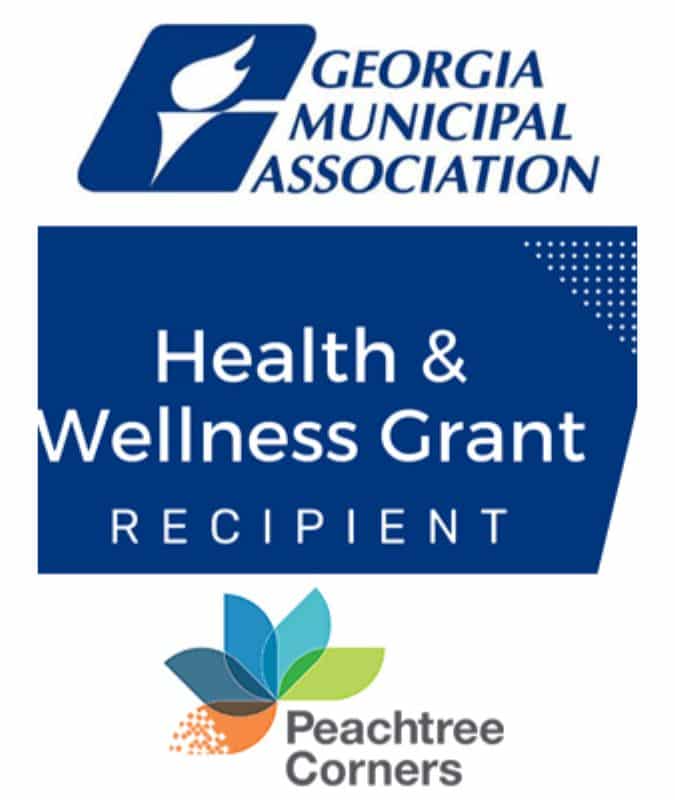
The City of Peachtree Corners has been awarded one of the 2024 Health Wellness Grants by the Georgia Municipal Association (GMA). The grant supports the city’s commitment to facilitating positive change in workplace culture and going the extra mile for employees’ health and wellness.
GMA is honored to collaborate with the City of Peachtree Corners at every step of their health wellness journey. Awards are made statewide to participating employers enrolled in one or more medical plans through the Georgia Municipal Employees Benefit Services (GMEBS) Life and Health Insurance Fund.
The Health Wellness Program at GMA helps members embrace a variety of skills, mindsets and cultures to encourage utmost well-being through workplace health wellness initiatives. These initiatives have demonstrated a track record of improving employee well-being and quality of life while enhancing workplace morale, reducing medical claims and maximizing cost impact.
“As a city, we are committed to fostering an environment where our employees’ health and well-being are a top priority,” said City Manager Brian Johnson. “This grant will enable us to build on our efforts to create a workplace culture that not only promotes wellness but also empowers our staff to make healthier lifestyle choices every day. Our employees are our greatest asset, and investing in their well-being ultimately benefits both the City of Peachtree Corners and the community we serve.”
Workplace health wellness
The City of Peachtree Corners has designated a Health Wellness Champion to coordinate/oversee the program and work in partnership with GMA to facilitate the planning of targeted activities. Jennifer Bonacci, assistant finance director, has expounded on how the City of Peachtree Corners will benefit from implementing workplace health wellness initiatives.
“We are excited to use our grant money to help make a difference in the lives of our employees by creating an atmosphere of health and wellness,” said Bonacci. “Adult fitness opportunities are often put on the back burner due to work schedules, long commutes and family obligations. We hope to enable our employees to make small choices each day to increase their overall health and wellness and build a community of support and encouragement around health and wellness.”
For more about the City of Peachtree Corners, visit peachtreecornersga.gov/1/Home.
To learn more about GMA’s Health Wellness Program, visit them online here.
Related
Health & Wellness
The NOW Massage Opens Peachtree Corners Boutique at The Forum
Published
7 months agoon
October 15, 2024
Grand opening set for October 21
The NOW Massage, a growing wellness franchise offering high-quality, affordable massage services in a chic, inspired setting, will open its first Peachtree Corners location on Monday, October 21. The boutique, located in a 2,414-square-foot space at The Forum, is owned and operated by area residents Devin and Amanda Borland, who also own and operate The NOW Massage Roswell. They bring over a decade of sales and customer service experience to their franchising journey with The NOW.
“After building a loyal following of guests and Ritual Members at our Roswell boutique, we look forward to introducing Peachtree Corners to The NOW’s menu of customizable massages, monthly memberships and nourishing products,” said Devin.

Each The NOW Massage location is designed with a minimalist aesthetic that incorporates raw elements and natural materials to create a soothing oasis. Interiors feature natural wood surfaces and exposed beams coupled with sheep skins and rawhides, cactus galleries and crystal grids, setting the tone for a relaxing experience.
Grand opening specials
To celebrate the boutique’s grand opening week from October 21–28, all massage bookings will receive a complimentary enhancement. Guests can choose from two of The NOW’s best-selling signature add-on treatments to amplify their therapeutic massage, including Herbal Heat Therapy, in which heat packs are used on the neck and back during treatment to provide a deeper sense of relaxation or Fresh Eyes, a soothing, hydrating eye mask with vitamins and antioxidants.
For guests who want to make massage a regular part of their monthly or bi-monthly self-care routine, The NOW also offers Ritual Membership packages that include savings on massages, roll over credits, perks and more.
The first 50 guests to join as a Ritual Member at the Peachtree Corners location will receive a complimentary curated gift bag filled with a selection of best-selling products from the company’s Nourish, Scent and Room collections.

With boutiques currently open from coast to coast and steady expansion on the horizon, The NOW Massage is excited to bring its thoughtfully crafted menu, healing products and signature design to The Forum in Peachtree Corners and to other cities across the United States.
For more information or to book a massage, visit thenowmassage.com/peachtree-corners.
Related
Read the Digital Edition
Subscribe
Keep Up With Peachtree Corners News
Join our mailing list to receive the latest news and updates from our team.
You have Successfully Subscribed!

GA Tech Launches First-of-its-Kind GT Atrium in Peachtree Corners

Katherine Lafourcade — A Journey of Passion, Resilience and Giving Back

Digital Edition

PCBA Announces 2025 Scholarship Winner

Paul Duke STEM High School Student Earns CGO Scholarship

World Blood Donor Day Starts Here: Theo’s Miracle, Katherine’s Mission [Podcast]

Peachtree Corners Grows Business Opportunities Through Economic Development

Executive Function: A Tribute to Working Moms

Simpson Elementary Marks Exceptional Children’s Week

Executive Function: A Tribute to Working Moms

Official City Merchandise Line Debuts This Saturday at Town Green

Peachtree Corners Grows Business Opportunities Through Economic Development

Digital Edition

World Blood Donor Day Starts Here: Theo’s Miracle, Katherine’s Mission [Podcast]

Paul Duke STEM High School Student Earns CGO Scholarship

PCBA Announces 2025 Scholarship Winner

Light up the Corners [Video]

Capitalist Sage: Business Leadership in Your Community [Podcast]

Cliff Bramble: A Culinary Adventure through Italy

Top 10 Brunch Places in Gwinnett County

A Hunger for Hospitality

THE CORNERS EPISODE 3 – BLAXICAN PART 1

Top 10 Indoor Things To Do This Winter

The ED Hour: What it takes to Remove Barriers from Education

Peachtree Corners Life
Topics and Categories
Trending
-
Digital Edition4 days ago
Digital Edition
-
Podcast4 days ago
World Blood Donor Day Starts Here: Theo’s Miracle, Katherine’s Mission [Podcast]
-
Business3 days ago
Peachtree Corners Grows Business Opportunities Through Economic Development
-
Community2 days ago
Executive Function: A Tribute to Working Moms








